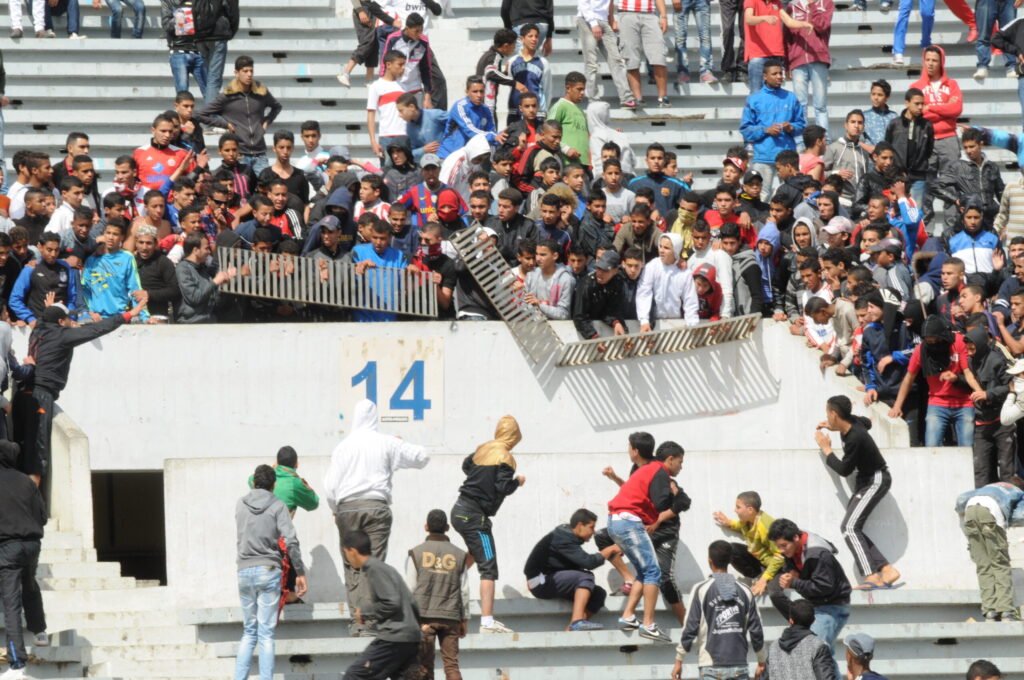
Image credit: “Football match violence” by Magharebia is licensed under CC BY 2.0.
Football banning orders are made by the courts to help prevent violence or disorder at, or in connection with, regulated football matches. An individual with a banning order is prevented from attending all regulated matches in the UK and may be required to hand over their passport to the police before overseas matches and tournaments. Banning orders are issued either following a conviction for a football-related offence or following a complaint by a local police force, British Transport Police (BTP), or the Crown Prosecution Service (CPS). A football banning order lasts for a minimum of 3 years and no more than 5 years, however in cases where a person was sentenced to a term of imprisonment for the original offence, an order lasts for a minimum of 6 years, and no more than 10 years.
Incidents giving rise to police investigation
Incidents were reported at 1,516 football matches in the 2022 to 2023 football season (50% of a total 3,024 matches). The number of matches with reported incidents decreased by 6% (-93 matches) compared with 1,609 matches in the 2021 to 2022 season.
In the 2022 to 2023 football season there were 2,264 football-related arrests under Schedule 1 of the Football Spectators Act 1989. This included 200 arrests for the possession of class A drugs, which became a Schedule 1 offence in November 2022, and 101 arrests in England and Wales relating to the 2022 World Cup in Qatar. The majority of arrests were of supporters of clubs in the top 5 English football divisions (90%).
The most common football-related arrest offence types were public disorder (34%), violent disorder (21%), alcohol offences (9%) and the possession of class A drugs (9%; this became a Schedule 1 offence in November 2022).
For clubs in the top 5 divisions, around half (47%; 962) of the 2,037 football-related arrests were at home games. The club with the highest number of supporters arrested in the 2022 to 2023 season for the second consecutive year was West Ham United, with 89 arrests.
How many banning orders were made?
Within the 2022 to 2023 football season, 682 new banning orders were issued, an increase of 32% compared with the 2021 to 2022 football season.
Data taken on 1 August 2023 showed there were a total of 1,624 football banning orders in force, an increase of 24% compared with 28 July 2022 (1,308).
Is there a particular demographic?
Of the 1,624 football banning orders in force on 1 August 2023, almost all (99.6%; 1,618) were issued to males. Around 70% (1,133) were issued to those aged between 18 and 34 and 2% (39) were issued to those aged 17 and under.
Club level statistics
In the 2022 to 2023 season, Manchester United supporters had the highest number of football banning orders in force (69) and ranked in the top 5 for the first time since the 2016 to 2017 season (when they ranked fifth). Millwall supporters had the second highest number of football banning orders in force (66) and for the second consecutive season they ranked in the top 5. West Ham United had the fifth highest number of football banning orders in force (52) and ranked in the top 5 for the first time since the 2019 to 2020 season (when they ranked second).
The legal framework around football banning orders is particularly complex, if you are being investigated or prosecuted in relation to any football related incidence you need to obtain legal advice at the outset. All of our solicitors are experts in this field and can work to obtain the best outcome.
How can we help?
We ensure we keep up to date with any changes in legislation and case law so that we are always best placed to advise you properly. If you would like to discuss any aspect of your case, please contact any member of our vastly experienced Criminal Defence team, for assistance with any criminal law related matter.
–
Mr John Stokes (John.Stokes@danielwoodman.co.uk),
Mr Anthony Pearce (Anthony.Pearce@danielwoodman.co.uk) or
Mr Daniel Woodman (Daniel.Woodman@danielwoodman.co.uk).









